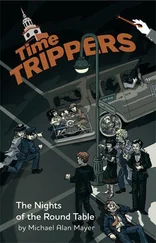“Tanz was the personification of war—of a war which was nothing more nor less than a cruel, pointless, uncontrolled blood-bath. A man who devotes himself to war in the same way as others fall prey to an irresistible vice is exactly like someone infected with the plague, syphilis or any other virulent disease.
“Thus the face of the general named Tanz—christened General Totentanz (‘Dance of Death’) by one of his men—was merely the mask of war, an iron mask concealing blood-lust, destruction—perhaps, even, Hell itself.”
FINAL REPORT
ADDITIONAL PARTICULARS RELATING TO THE “TANZ CASE”
Statement by Wyzolla, made a few days after the foregoing events and taken in West Berlin at a so-called emergency recording session: “It was like this: I only did my duty in the East, that’s all. Of course, I had a good think about things—saw a lot of mistakes, too. Wyzolla, I said, that’s not right, you can’t do things like that. What mistakes? Well, for instance, take all this fuss about war-mongers. Take Adenauer, for instance. He’s one—yes, that’s what they tried to make out. Well, I thought it over and I said to myself: Wyzolla, I said to myself, that can’t be true. How can a man who’s never seen service be a war-monger? And they said to me: There you are -that’s just it.”
“And so it went on. I got pretty puzzled sometimes, I can tell you. For instance, they told me Krupp was a war criminal. Well, I found that easier to believe—all those guns and so on. But then I read something about the Leipzig Fair—and what do you think it said? Krupp was exhibiting there. Yes, sir, in the German Democratic Republic. Well, I reckoned that if Krupp was a war criminal and in the G. D. R. as well he couldn’t be in West Germany. So which side are the war criminals on? You see how they pull the wool over your eyes?
“You want to know how I joined the army? I was drafted. No nonsense about volunteering. The most you can say is, I joined up to avoid being sent to a forced labour camp or a uranium mine as an enemy of peace. What’s that, press-ganged? Yes, that’s right. Not that I’ve got anything against military service as such. Someone’s got to do it, but not on the wrong side. Anyway, now I’m—what do you call it?—following the dictates of my conscience.
“I don’t know a thing about Tanz. Orders are orders and duty is duty. I was his driver, that’s all.”
Letter from Prévert’s secretary to a newspaper editor who had requested answers to specific questions: “… M. Prévert greatly regrets that he is unable to accede to your request. His visit to Berlin in July 1956 was of a purely official nature. M. Prévert considers that it would be improper to disclose any details, especially as no written notes were kept and he was not engaged in any specific inquiries.
“M. Prévert also regrets to inform you that the files appertaining to the murder in the Rue de Londres in July 1944 are not available for inspection. He is only at liberty to tell you that, as far as the Sûreté is concerned, the matter is closed and is no longer being treated as an unsolved case.
“Furthermore, M. Prévert wishes to draw your attention to the fact that the name Hartmann, which figures repeatedly in your questions, does not appear in our records. No one by that name had anything to do with the abovementioned case or any other case within our jurisdiction. Assertions to the contrary may render you liable to severe penalties. M. Prévert hopes that you will profit by his advice…”
Closing remarks from Kahlenberge’s lecture: “…I venture to submit, therefore, that it is impossible to dismiss all that has happened in the past few decades as a tragic and deplorable, but unique and exceptional phenomenon. What confronts us is the dissolution of a social stratum which has been inexorably bypassed—perhaps I should say, trampled upon—by the march of history. Within the brief span of half a century, the German officer has had to come to terms with Prussia, Kaiser and Reich, with the Weimar Republic, with Hitler, with democracy and, finally, with ideologies and power blocs which span whole continents.
“It is stupidity, self-delusion or conscious deception to go on talking of the good old values—e.g., of a tradition which people not only cherish but propose to borrow from substantially in future. What could be more ridiculous than to put yesterday’s bankrupt in charge of tomorrow’s business?
“Only fundamental changes in structure can produce new and hardy growth. We do not want a further instalment from a torn, dog-eared, obsolete history book. We must have the courage to make a fresh start, deliberately and unflinchingly. The alternative is self-destruction." (This lecture was never delivered.)
Excerpt from Frau Wilhelmine von Seydlitz-Gabler’s diary: “I have seen many things in my time, but the Tanz affair shook me to the core. He was such a magnificent person. I was one of the last people he spoke to. ‘Dear lady,’ he said, ‘how wonderful it is to be among friends again.’ He was chivalrous to the very last.
“Herbert considerately spared me a last sight of the man we had valued so highly. ‘Remember him as he was’, he said. Herbert is like that.
“Kahlenberge—my friend no longer—thought fit to tell us a story like something out of a penny dreadful. It was so indelicate and disrespectful to the dead that I was speechless with anger. Herbert merely nodded and said: ‘Who knows the real truth about anything?’ ”
From a letter to the Author by Herr Kahlert, the historian, dated 18th December 1961: “…I can assure you that I followed the events in question very closely, if only for academic reasons. Exhaustive inquiries have led me to conclude that the suppositions still entertained by a few individuals today—entirely without justification, I hasten to add—spring from a series of fortuitous coincidences and questionable deductions.
“To sum up the result of my investigations: General Tanz was not murdered by either side. Furthermore, there is no question of suicide. I can adduce a whole mass of convincing evidence, all of it psychologically sound, to support my contention. I will not go into details here. Suffice it is to say that, judging by his natural disposition (on which there is ample corroborative evidence), Tanz was not the sort of man to raise a hand against himself.
“The only valid inference is that it must have been an accident, probably caused while cleaning a pistol.
“As for the absolutely fantastic allegations made by Hartmann, I believe I have already made it clear that I had ample opportunity to study that unfortunate individual at close quarters. He has undoubtedly had a hard time, but my sympathy for him cannot be allowed to obscure the plain and unvarnished truth: the man is a pathological liar.”
Remarks made by the popular recording star Britta B. during the later stages of a party held in honour of an internationally famous film actor on the occasion of the première of an American film dealing with the rehabilitation of Germany: “He was crazy about me—General Tanz, I mean. Not that he showed it, of course, but a woman can tell these things, deep down inside.
“The press breathed down my neck for days afterwards. Well, it was only to be expected with a sensation like that, wasn’t it? It didn’t last long, though. The story only made the front page for one day. They ran it on the inside pages for the next three days, and two or three weeks later the subject was dead as a door-nail. All the same, my disc—you know, Kiss me when the sun shines, kiss me in the rain—stayed in the Top Twenty for nearly four months. Just shows you, doesn’t it?
“Get to the point? What do you think I’m doing, sweetie? Well, someone rushes into the room and yells: ‘He’s dead—shot!’ It gave us all an awful shock. I was standing next to von Seydlitz-Gabler—he’s a field-marshal or something like that, all kinds of decorations—lots more than Mende—anyway, a hero—and do you know what he said? Go on, have three guesses.
Читать дальше












